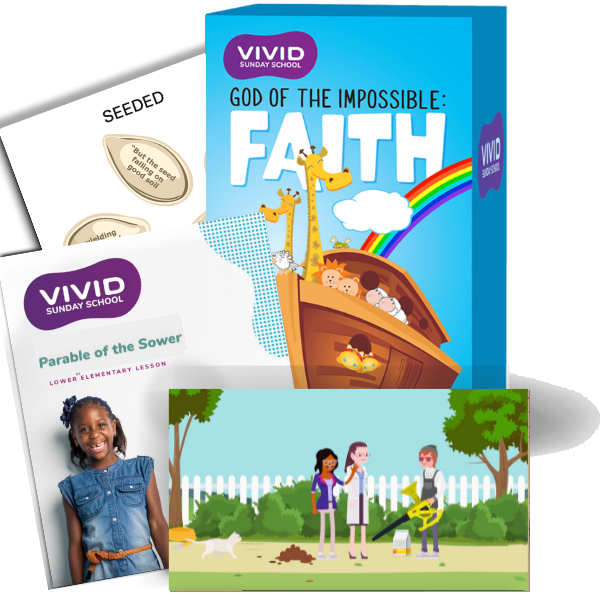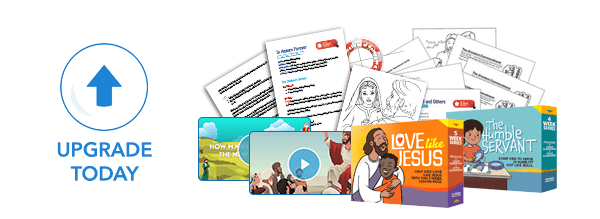Curriculum
Parable of the Sower
Memory Verse:
“But the seed falling on good soil refers to someone who hears the word and understands it. This is the one who produces a crop, yielding a hundred, sixty or thirty times what was sown.” (Matthew 13:23)
Summary of this lesson plan...
Jesus taught in parables to show His love, as seen in the parable of the sower. A farmer sowed seeds, but the outcome depended on the soil, illustrating how people respond to God's Word. Some seeds fell on rocky, thorny, or dry soil, while others landed on good soil, producing a crop. We are called to share God's love and Word, but it's God who makes it grow. (Matthew 13:23)Bible Background
What Kids Will Learn
Jesus told a parable about a farmer sowing seeds. The farmer did his part, simply sowing seeds. There are many things that can happen after that, and God’s the one in charge.
Scripture Summary
Jesus often taught in parables—earthly stories with eternal meanings. Since one of the main occupations in Bible times was farming, many of Jesus’ parables centered on agriculture. His listeners easily grasped the concrete concepts and could then apply the teaching to the more abstract gospel message.
The parable of the sower is told in Matthew—and also Mark 4 and Luke 8. In each of the accounts, Jesus begins by simply stating, “A farmer went out to sow his seed.” (Matthew 13:3) The rest of the parable focuses on what happens to the sown seed and how this applies to sharing God’s Word with others.
Four things can happen to the seed after it’s tossed onto the soil:
- The seed can be snatched away even before entering the ground. This applies especially when someone lacks understanding of God’s Word. Satan is ready and eager to steal the truth.
- The seed can fall on rocky places without much soil. Any new believer needs time to grow roots of truth and experience within the Christian faith. Without strong roots, faith cannot survive.
- The seed can grow among thorns and weeds. God’s truth changes lives. But when someone hears His Word while holding tightly to the world, his new faith can be choked.
- The seed can land on healthy and prepared soil. When someone hears God’s truth, understands it, and applies it to his or her life, God’s fruit grows and multiplies.
People will respond differently to God and His Word. They’re at different points of their own journeys and navigating personal circumstances. And some are not yet ready to fully receive His teaching. One day, though, they just might be ready.
Why Is This Important
As believers, we all have a responsibility to share God, His love, and His Word with others around us. We can’t know the outcome, as some seeds take a long time to grow. But listening to His prompting and planting seeds is how we share God with others.
Teacher Devotion
Scripture
“‘A farmer went out to sow his seed.’” (Matthew 13:3)
I’m what you could call hyper-responsible. Rather than a healthy dose of responsibility and owning my own stuff, I take on responsibility that isn’t mine. I “help” straighten and face books as a customer at a bookstore. I offer well-intended advice to my kids that contradicts what their Little League coach said. And I can help a coworker with a project while missing my own deadline.
I need to learn to stay in my own lane. Jesus reaffirms this multiple times. He gently tells Martha that she’s distracted by many things (Luke 10). And in the parable of the sower, there’s just one statement about the main character, the sower. He sowed his seed (Matthew 13). Period.
Within the several verses that follow, Jesus continues the parable and explains what can happen to the sown seed. The seed can fall on rocky soil, be choked by weeds, or be snatched away by the enemy. Or, the seed can land in a willing and receptive environment where it will grow and flourish. While God has called me to share His love with others, I have no responsibility over what will happen after that.
When we welcome children into our ministry, we have no control over what circumstances they’re dealing with or how they’ll embrace God’s truth. We do have a responsibility to share God, His love, and His Word with each child in our care.
Take a moment to think of the children in your care. They can be inside your home or in your ministry. Ponder each name and face that comes to mind. As you do, offer a prayer of thanksgiving for each child. And pray for the planted seed—God’s Word—to take root within their lives.
Prayer
Dear God, I pray for the children in my life. I thank You for the honor of sharing You with them. Please help them open their hearts and minds to You—now and in the days to come. In Jesus’ name, amen.
Bible Memory Verse
You’ll Need: Bible, Brown construction paper, “Seeded” handouts, Scissors, Glue, Markers
Get Ready: Before class, print the “Seeded” handout, one per child.
“But the seed falling on good soil refers to someone who hears the word and understands it. This is the one who produces a crop, yielding a hundred, sixty, or thirty times what was sown.” (Matthew 13:23)
- Read aloud Matthew 13:23.
- Invite kids to repeat after you as you read the verse again. Do this several times.
- Give each child a “Seeded” handout and a pair of scissors.
- Invite kids to cut out the seeds and put them in the order of the Bible memory verse.
- Give each child a sheet of brown construction paper and set out markers to share.
- Invite kids to write “Good Soil” at the top of the brown construction paper. Then have kids glue the seed cutouts in the correct order.
SAY: Great job learning today’s Bible memory verse. Let’s learn more about what it means to be like good soil and receive God’s Word.
Interactive Bible Experience
You’ll Need: Bible, Seeds
- Read aloud Matthew 13:1-9, 18-23.
- Remind kids of the four types of soil in today’s lesson: dry, rocky, thorny, and good soil.
- Gather kids and go outside.
- Give each child a small handful of seeds.
- Lead kids in tossing seeds on the pavement.
- Lead kids in tossing seeds on rocks.
- Lead kids in tossing seeds on weeds.
- Lead kids in tossing seeds on good soil.
- Have kids join you in saying or reading today’s Bible memory verse as a reminder of what Jesus says about good soil.
ASK:
- What happened when you threw seeds on the hard pavement?
- What did you learn about good soil?
SAY: When it comes to loving God and knowing His Word, we want to be like the good soil, and that means having hearts that are receptive to God’s teaching. Let’s learn more about that now.
Snack
Garden-Grown Cupcakes
You’ll Need: Plates, Napkins, Cupcakes with chocolate frosting, Oreo cookies, crushed, Brown sprinkles, Jelly beans in various sizes and colors
- Have kids clean their hands.
- Give each child a plate, a napkin, and a cupcake with chocolate frosting.
- Invite kids to pretend the chocolate frosting is good soil, adding crushed Oreos, brown sprinkles, and jelly beans to be “seeds” of various kinds.
- Remind kids that when we have hearts receptive to God’s Word and His teachings, we are like “good soil” that produces crops.
- Enjoy!
Game
Good Soil Toss
You’ll Need: Large play area, Masking tape, Marker, Construction paper, Cornhole bags
Get Ready: Before class, use masking tape to create a “path” and several other designated areas. Use a marker to write “good soil,” “dry soil,” “rocky soil,” and “weeds and thorns” on different pieces of construction paper. Use the construction paper to label each of the taped-off areas. (Make the “good soil” area fairly small.)
- Form two teams and have kids line up at one end of the classroom.
- Explain how the room is laid out, with different areas of “good soil,” “dry soil,” “rocky soil,” and “weeds and thorns.”
- Give each team a set of cornhole bags.
- Explain that one at a time, a player from each team will toss the cornhole bag. If the bag lands on any of the bad soils, the team will lose one point. If the bag lands on the “good soil,” the team will get three points.
- This is not a racing game, and only two players will toss at a time while the teacher keeps score.
- Play several rounds as time allows, then tally up the points.
ASK:
- Was it hard or easy to land in “good soil”?
- How is this like our hearts toward God?
SAY: It can be hard to have willing hearts that are receptive to God’s Word. When we take what we learn from the Bible and in Sunday school, our lives will produce good fruit just like Jesus intended. You will be helping others to grow in their knowledge and understanding of God’s love.
Craft
“Seeded” With God
You’ll Need: Small flowerpots, Markers, Potting soil, Different types of seeds
- Give each child a small flowerpot and set out markers to share.
- Invite kids to write “good soil” on their pots or draw pictures that represent today’s lesson.
- When kids have finished drawing on their flowerpots, give each child some potting soil and seeds.
- Have kids plant their seeds one by one.
- Invite kids to take their flowerpots home as a reminder that we are to be “good soil” so that God’s Word can be planted in our hearts.
SAY: When we have hearts that are receptive to God’s teaching, we are like the “good soil” that allows seeds to take root. God’s Word takes root in our hearts and grows so that others might know Him.
Prayer
Willing Heart Prayers
- Help children think of a daily prayer they can use that will prepare their hearts to receive God’s teaching.
- Invite the children to share their daily prayer with the group. Allow each child to speak, helping as necessary.
- Close in prayer.
PRAY: Dear Jesus, thank You for Your parables that teach us to be more like You. Help us have hearts made of good soil so Your teachings can be planted and grow deep roots in our hearts. In Your name, amen.
Reseñas de Maestros
Revisa este contenido
Comparte tus pensamientos con otros
Lo que dicen los maestros
No se han agregado reseñas aún, ¡sé el primero en reseñar!

